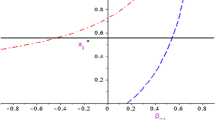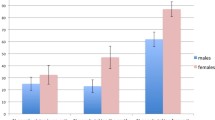Abstract
This paper shows that altruism may be beneficial in bargaining when there is competition for bargaining partners. In a game with random proposers, the most altruistic player has the highest material payoff if players are sufficiently patient. However, this advantage is eroded as the discount factor increases, and if players are perfectly patient altruism and spite become irrelevant for material payoffs.
Similar content being viewed by others
References
Aumann R.J. (1985). On the non-transferable utility value: a comment on the Roth–Shafer examples. Econometrica 53: 667–678
Baron D.P. and Ferejohn J.A. (1989). Bargaining in legislatures. American Political Science Review 83: 1181–1206
Bester H. and Güth W. (1998). Is altruism evolutionarily stable?. Journal of Economic Behavior and Organization 34: 193–209
Binmore, K. (1985), Bargaining and coalitions, in Roth, A. (ed.), Game Theoretic Models of Bargaining, Cambridge University Press.
Binmore K.G. (1987a). Nash Bargaining Theory II. In: Binmore K.G., Dasgupta P. (eds). The Economics of Bargaining. Oxford, Blackwell, pp. 61–76
Binmore K.G. (1987b), Perfect equilibria in bargaining models. In: Binmore K.G., Dasgupta P. (eds). The Economics of Bargaining. Oxford, Blackwell, pp. 77–105
Bolton G.E. and Ockenfels A. (2000). ERC – a theory of equity, reciprocity and competition. American Economic Review 90(1): 166–193
Calvert, R.L. and Dietz, N. (1998), Legislative Coalitions in a Bargaining Model with Externalities. W. Allen Wallis Institute of Political Economy Working Paper No 16.
Charness G. and Rabin M. (2002). Understanding social preferences with simple tests. Quarterly Journal of Economics 117: 817–869
Chatterjee K., Dutta B., Ray D. and Sengupta K. (1993). A noncooperative theory of coalitional bargaining. Review of Economic Studies 60: 463–477
Fehr E. and Schmidt K.M. (1999). A theory of fairness, competition and cooperation. Quarterly Journal of Economics 114: 817–868
Fehr, E. and Schmidt, K.M. (2003), Theories of fairness and reciprocity – evidence and economic applications, in Dewatripont, M., et.al., Advances in Economics and Econometrics, Eighth World Congress of the Econometric Society, Vol. 1, Cambridge: Cambridge University Press, pp. 208–257.
Harrington J.E. (1990). The role of risk preferences in bargaining when acceptance of a proposal requires less than unanimous approval. Journal of Risk and Uncertainty 3: 135–154
Kawamori T. (2005). Players’ patience and equilibrium payoffs in the Baron–Ferejohn model. Economics Bulletin 3: 1–5
Levine D.K. (1998). Modeling altruism and spitefulness in experiments. Review of Economic Dynamics 1: 593–622
Montero M. (2007). Inequity aversion may increase inequity. Economic Journal 117: C192–C204
Nash J. (1950). The bargaining problem. Econometrica 18: 155–162
Norman P. (2002). Legislative bargaining and coalition formation. Journal of Economic Theory 102: 322–353
Okada A. (1996). A noncooperative coalitional bargaining game with random proposers. Games and Economic Behavior 16: 97–108
Possajennikov A. (2000). On the evolutionary stability of altruistic and spiteful preferences. Journal of Economic Behavior and Organization 42: 125–129
Possajennikov A. (2001). Equilibrium selection in a merger game. Economics Letters 72: 255–261
Rubinstein A. (1982). Perfect equilibrium in a bargaining model. Econometrica 50: 97–108
Sutton J. (1986). Non-cooperative bargaining theory: an introduction. Review of Economic Studies 53: 709–724
Author information
Authors and Affiliations
Corresponding author
Rights and permissions
About this article
Cite this article
Montero, M. Altruism, Spite and Competition in Bargaining Games. Theory Decis 65, 125–151 (2008). https://doi.org/10.1007/s11238-007-9087-6
Received:
Accepted:
Published:
Issue Date:
DOI: https://doi.org/10.1007/s11238-007-9087-6




